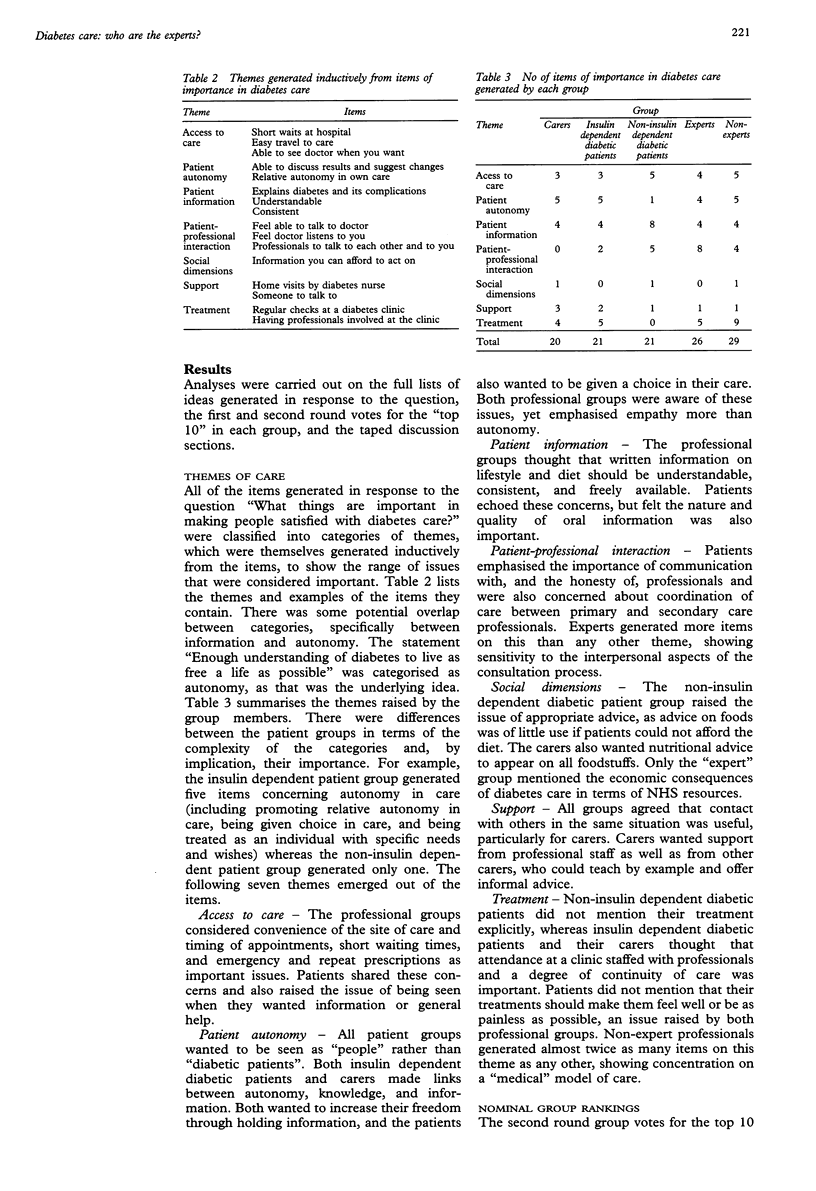Abstract
OBJECTIVES--To identify issues that patients and professionals consider important in diabetes care and differences in their priorities for care and to determine patients' and professionals' judgements of the relative importance of their chosen priorities. DESIGN--Structured group interviews using the nominal group technique. SETTING--Five district health authorities on Tyneside. SUBJECTS--Five nominal groups: expert (seven), non-expert (seven) health care professionals; insulin dependent (four), non-insulin dependent patients (eight); and carers of diabetic patients (eight). MAIN MEASURES--Items important in diabetes care to each nominal group (themes of care), ranked into a series of "top 10" items for each group, and allocated a score according to relative importance to individual members; scores were standardised by individual weighting and group weighting for comparison within and between groups. RESULTS--Patients and professionals agreed that information given to patients, interaction between professionals and patients, patient autonomy, and access were important for good diabetes care, but the importance assigned to each differed. Thus the professionals emphasised empathy and aspects of good communication and patients the desire to know enough to live a "normal" life. Differences were also found within the patient groups; these related to changes in patients' needs at specific points in the development of their illness and in their orientations to care. CONCLUSION--Patients differ from professionals in their orientation to diabetes care, and they can, and should, be involved in setting priorities for care. Since these priorities are dynamic further work is needed to explore the nature of patient satisfaction with diabetes care.
Full text
PDF





Selected References
These references are in PubMed. This may not be the complete list of references from this article.
- Calnan M. Towards a conceptual framework of lay evaluation of health care. Soc Sci Med. 1988;27(9):927–933. doi: 10.1016/0277-9536(88)90283-3. [DOI] [PubMed] [Google Scholar]
- Charlton J. R., Patrick D. L., Matthews G., West P. A. Spending priorities in Kent: a Delphi study. J Epidemiol Community Health. 1981 Dec;35(4):288–292. doi: 10.1136/jech.35.4.288. [DOI] [PMC free article] [PubMed] [Google Scholar]
- Fitzpatrick R., Hopkins A. Problems in the conceptual framework of patient satisfaction research: an empirical exploration. Sociol Health Illn. 1983 Nov;5(3):297–311. doi: 10.1111/1467-9566.ep10491836. [DOI] [PubMed] [Google Scholar]
- Gabbay J., Francis L. How much day surgery? Delphic predictions. BMJ. 1988 Nov 12;297(6658):1249–1252. doi: 10.1136/bmj.297.6658.1249. [DOI] [PMC free article] [PubMed] [Google Scholar]
- Horton J. N. Nominal group technique. A method of decision-making by committee. Anaesthesia. 1980 Aug;35(8):811–814. doi: 10.1111/j.1365-2044.1980.tb03924.x. [DOI] [PubMed] [Google Scholar]
- Locker D., Dunt D. Theoretical and methodological issues in sociological studies of consumer satisfaction with medical care. Soc Sci Med. 1978 Jul;12(4A):283–292. [PubMed] [Google Scholar]
- Phillips M. S., McGowan B. C., Williams R. B. Solving problems through staff participation in focus groups. Am J Hosp Pharm. 1986 May;43(5):1214–1217. [PubMed] [Google Scholar]
- Van de Ven A. H., Delbecq A. L. The nominal group as a research instrument for exploratory health studies. Am J Public Health. 1972 Mar;62(3):337–342. doi: 10.2105/ajph.62.3.337. [DOI] [PMC free article] [PubMed] [Google Scholar]
- Whittle J. G., Grant A. A., Sarll D. W., Worthington H. V. The Delphi technique: its use in dental health services research assessed in a study to improve care for elderly mentally ill patients. Community Dent Health. 1987 Sep;4(3):205–214. [PubMed] [Google Scholar]



